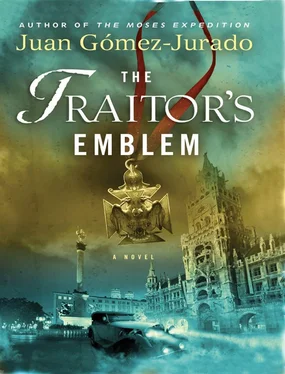Juan Gomez-Jurado - The Traitor's emblem
Здесь есть возможность читать онлайн «Juan Gomez-Jurado - The Traitor's emblem» весь текст электронной книги совершенно бесплатно (целиком полную версию без сокращений). В некоторых случаях можно слушать аудио, скачать через торрент в формате fb2 и присутствует краткое содержание. Жанр: Триллер, на английском языке. Описание произведения, (предисловие) а так же отзывы посетителей доступны на портале библиотеки ЛибКат.
- Название:The Traitor's emblem
- Автор:
- Жанр:
- Год:неизвестен
- ISBN:нет данных
- Рейтинг книги:4 / 5. Голосов: 1
-
Избранное:Добавить в избранное
- Отзывы:
-
Ваша оценка:
- 80
- 1
- 2
- 3
- 4
- 5
The Traitor's emblem: краткое содержание, описание и аннотация
Предлагаем к чтению аннотацию, описание, краткое содержание или предисловие (зависит от того, что написал сам автор книги «The Traitor's emblem»). Если вы не нашли необходимую информацию о книге — напишите в комментариях, мы постараемся отыскать её.
The Traitor's emblem — читать онлайн бесплатно полную книгу (весь текст) целиком
Ниже представлен текст книги, разбитый по страницам. Система сохранения места последней прочитанной страницы, позволяет с удобством читать онлайн бесплатно книгу «The Traitor's emblem», без необходимости каждый раз заново искать на чём Вы остановились. Поставьте закладку, и сможете в любой момент перейти на страницу, на которой закончили чтение.
Интервал:
Закладка:
Yes, Paul, your father didn’t die in a shipwreck as we told you, something you guessed not long before we were thrown out of the baron’s home. That would have been an apt death for him, all the same.
Hans Reiner was born in Hamburg in 1876, though his family moved to Munich when he was still a boy. He ended up loving both cities, but the sea was his only real passion.
He was an ambitious man. He wanted to be a captain, and he succeeded. He was already a captain when we met at a dance around the turn of this century. I don’t remember the date exactly, I think it was late 1902, but I can’t be sure. He asked me to dance, and I said yes. It was a waltz. By the time the music had finished, I was hopelessly in love with him.
He courted me between sea voyages and ended up making Munich his permanent home just to please me, however inconvenient this was for him professionally. The day he walked into my parents’ house to ask your grandfather for my hand was the happiest day of my life. My father was a big, genial man, but that day he was very solemn and even shed a tear. It’s sad that you never had the chance to meet him; you would have liked him very much.
My father said we would have a party to celebrate, a big engagement party in the traditional style. A whole weekend, with dozens of guests and a fine banquet.
Our little home wasn’t suitable, so my father asked my sister’s permission to hold the event at the baron’s country house in Herrsching am Ammersee. In those days your uncle’s enthusiasm for gambling was still under control, and he had several properties scattered across Bavaria. Brunhilda agreed, more in order to stay on good terms with my mother than for any other reason.
When we were little, my sister and I were never that close. She was more interested in boys, dances, and fancy outfits than I was. I preferred to stay at home with my parents. I was still playing with dolls when Brunhilda went on her first date.
She’s not a bad person, Paul. She never was: only selfish and spoiled. When she married the baron, a couple of years before I met your father, she was the happiest woman in the world. What made her change? I don’t know. Boredom, perhaps, or your uncle’s infidelity. He was a self-confessed womanizer, something she had never noticed before, having been dazzled by his money and his title. Later, however, it became too obvious for her not to notice. She had a son with him, which I had never expected. Eduard was a sweet-natured, solitary child who grew up in the care of maids and wet nurses. His mother never paid him much attention because the boy had not served his purpose: to keep the baron on a short leash and away from his tarts.
Let’s go back to the weekend of the party. At noon on Friday the guests started to arrive. I was ecstatic, walking with my sister in the sun and waiting for your father to arrive to introduce them to each other. At last he appeared, in his military jacket, white gloves, and captain’s cap, and carrying a dress sword. He had dressed as he would for the engagement on Saturday night, and he said he’d done it to impress me. It made me laugh.
But when I introduced him to Brunhilda, something odd happened. Your father took her hand and held it for a little longer than was proper or appropriate. And she seemed bewildered, as though struck by a bolt of lightning. At the time I thought-fool that I was-that it was just embarrassment, but Brunhilda had never displayed even a hint of that emotion in her life.
Your father had just returned from a mission to Africa. He had brought me an exotic perfume used by the natives in the colonies, made with sandalwood and molasses, I believe. It had a strong and very distinctive scent but was also delicate and lovely. I clapped like a fool. I was delighted with it, and I promised him I would wear it for the engagement celebrations.
That night, while we were all asleep, Brunhilda let herself into your father’s bedroom. The room was completely dark, and Brunhilda was naked under her dressing gown, wearing only the perfume your father had given me. Without a sound she got into bed and made love to him. I still find it difficult to write these words, Paul, even now that twenty years have passed.
Your father, believing I had wanted to give him an advance on our wedding night, didn’t resist. At least, that was what he told me the following day as I looked him in the eye.
He swore to me, and swore again, that he hadn’t noticed anything until it was all over and Brunhilda spoke for the first time. She told him she loved him and asked him to run away with her. Your father threw her out of the room and the next morning he took me aside and told me what had happened.
“We can cancel the wedding if you want to,” he said.
“No,” I replied. “I love you, and I’ll marry you if you swear to me that you truly had no idea it was my sister.”
Your father swore again, and I believed him. After all these years I’m not sure what to think, but there is too much bitterness in my heart now.
The engagement went ahead, as did the wedding in Munich three months later. By then it was easy to make out your aunt’s swollen belly under the red lace dress she wore, and everyone was happy except for me, because I knew all too well whose child it was.
Finally the baron found out too. Not from me. I never confronted my sister or reproached her for what she had done, because I am a coward. Nor did I tell anyone what I knew. But it had to come out sooner or later: Brunhilda probably threw it in the baron’s face during an argument about one of his affairs. I don’t know for certain, but the fact is he found out, and this was partly to blame for what happened later.
I, too, became pregnant soon afterward, and you came into the world while your father was on what would be his final mission to Africa. The letters he wrote to me were increasingly dark, and for some reason-I don’t know why exactly-he felt less and less proud of the job he was doing.
One day he stopped writing altogether. The next letter I received was from the Imperial Navy, informing me that my husband had deserted and that I had a duty to notify the authorities if I heard from him.
I cried bitterly. I still don’t know what prompted him to desert, nor do I want to know. I learned too many things about Hans Reiner after his death, things that do not fit at all with the portrait I’d made of him. That was why I never spoke to you about your father, because he was not a role model or someone to be proud of.
Toward the end of 1904 your father returned to Munich without my knowledge. He came back secretly, with his first lieutenant, a man by the name of Nagel who had accompanied him everywhere. Instead of coming home, he went to seek refuge at the baron’s mansion. From there he sent me a brief note, and this is exactly what it said:
“Dear Ilse: I’ve made a terrible mistake, and I’m trying to fix it. I’ve asked your brother-in-law for help, and another good friend. They might be able to save me. Sometimes the greatest treasure is hidden in the same place as the greatest destruction, or at least I’ve always thought so. With love, Hans.”
I’ve never understood what your father meant by those words. I read the note over and over again, though I burned it a few hours after it arrived, for fear it might fall into the wrong hands.
As for your father’s death, all I know is that he was staying at the Schroeders’ mansion and one night there was a fierce argument after which he was dead. His body was thrown off a bridge into the Isar under the cover of darkness.
I don’t know who killed your father. Your aunt told me what I’m telling you here, almost to the word, though she was not present when it happened. She told me with tears in her eyes, and I knew that she was still in love with him.
Читать дальшеИнтервал:
Закладка:
Похожие книги на «The Traitor's emblem»
Представляем Вашему вниманию похожие книги на «The Traitor's emblem» списком для выбора. Мы отобрали схожую по названию и смыслу литературу в надежде предоставить читателям больше вариантов отыскать новые, интересные, ещё непрочитанные произведения.
Обсуждение, отзывы о книге «The Traitor's emblem» и просто собственные мнения читателей. Оставьте ваши комментарии, напишите, что Вы думаете о произведении, его смысле или главных героях. Укажите что конкретно понравилось, а что нет, и почему Вы так считаете.












